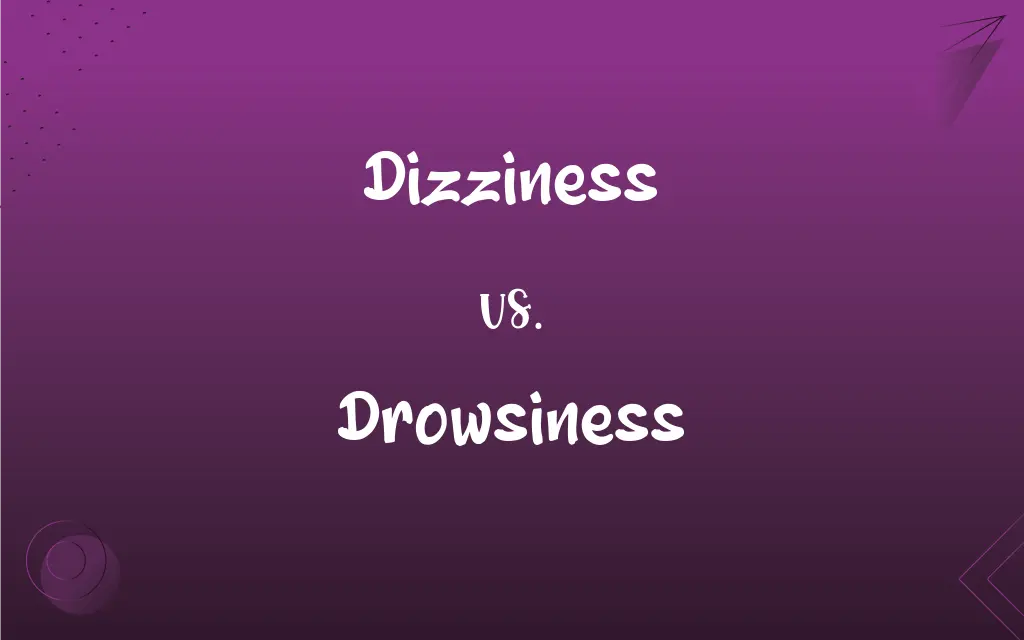Dizziness vs. Drowsiness: What's the Difference?
Edited by Aimie Carlson || By Harlon Moss || Updated on October 10, 2023
Dizziness refers to feeling unsteady, lightheaded, or experiencing a sensation of spinning. Drowsiness denotes a state of feeling sleepily fatigued, leading to a reduced level of alertness.

Key Differences
Dizziness is a sensation often encapsulated by a feeling of spinning, lightheadedness, or being off-balance, commonly resulting from issues or disturbances within the ear or from a rapid change in one’s head movement. Drowsiness: Contrarily, signifies a compelling inclination towards sleep and is not necessarily related to equilibrium but a state of low energy and diminished awareness. These states are distinctly different yet can occasionally intersect, as some individuals may feel drowsy when they are dizzy, or vice versa.
Dizziness can be provoked by several triggers, such as abrupt head movements, standing up too quickly, or issues related to the inner ear, impacting an individual’s balance and spatial orientation. Drowsiness, on the other hand, often emerges due to insufficient sleep, certain medications, or sometimes as a symptom of underlying health conditions, like sleep apnea, focusing more on an imperative towards sleep and lethargy rather than issues with balance.
Understanding dizziness requires acknowledgment of its physical manifestations, which might include a spinning room, loss of balance, or sometimes even nausea, frequently associated with the vestibular system. Drowsiness typically manifests as heavy eyelids, constant yawning, or an overpowering desire to sleep, signaling a stark distinction as it points towards a neurological response leaning towards the necessity of rest rather than a spatial disorientation.
Managing dizziness might include practices such as focusing on a fixed point during a dizzy spell or employing maneuvers recommended by healthcare professionals to recalibrate the vestibular system. Drowsiness, conversely, may be addressed through avenues like establishing a consistent sleep routine, managing stress, or reviewing medications with a healthcare provider, signifying the different methodologies in addressing the two varied conditions.
It’s pivotal to note that while dizziness is predominantly aligned with sensory confusion, perhaps making one feel as if the room is spinning or tilting, it usually lacks a consistent push towards the need for sleep. In contrast, drowsiness primarily propels an individual towards sleep or rest, due to a significant decrease in energy levels, displaying a fundamental difference in how these two states influence the human body and its functionalities.
ADVERTISEMENT
Comparison Chart
Definition
A sensation of spinning or unsteadiness
A state of strong desire for sleep
Common Causes
Inner ear issues, rapid head movements
Lack of sleep, certain medications
Symptoms
Lightheadedness, feeling off-balance
Heavy eyelids, yawning, lack of focus
Potential Treatments
Focusing on a point, vestibular maneuvers
Regular sleep patterns, stress management
Associated Sensations
Spinning, floating, tilting
Lethargy, low energy, sleep inclination
ADVERTISEMENT
Dizziness and Drowsiness Definitions
Dizziness
Dizziness encompasses a sensation of the surroundings moving or spinning.
He experienced dizziness and saw the room spinning around him.
Drowsiness
Drowsiness describes a condition where a person experiences persistent yawning and fatigue.
After the long drive, Lisa could hardly keep her eyes open due to intense drowsiness.
Dizziness
Dizziness implies a sense of unsteadiness and a loss of balance.
After spinning around, she was overwhelmed by dizziness and fell down.
Drowsiness
Drowsiness can refer to a sluggish state where mental alertness is significantly reduced.
Drowsiness from the medication made it difficult for her to focus on the lecture.
Dizziness
Dizziness can be characterized by a feeling of lightheadedness or faintness.
She felt dizziness when she suddenly stood up from the chair.
Drowsiness
Drowsiness is often signified by heavy eyelids and a consistent desire to sleep.
Despite trying to stay awake for the movie, his drowsiness took over, and he fell asleep.
Dizziness
Dizziness can evoke physical instability and a challenge in maintaining spatial orientation.
The severe dizziness made it difficult for him to walk in a straight line.
Drowsiness
Drowsiness is a strong inclination to fall asleep or be in a state of inactivity.
His drowsiness was so overpowering that he nodded off during the meeting.
Dizziness
Dizziness may include a perception of tilting even when stationary.
Despite sitting still, his dizziness gave him a sense of tilting.
Drowsiness
Drowsiness may involve a lethargic state, causing a slowdown in cognitive and physical responses.
Her drowsiness was evident when she slowly responded to the urgent email.
Dizziness
Having a whirling sensation and a tendency to fall.
Drowsiness
Dull with sleepiness; sluggish.
Dizziness
Bewildered or confused
"I was dizzy with anger and shame" (Amy Benson).
Drowsiness
Produced or characterized by sleepiness.
Drowsiness
Inducing sleepiness; soporific.
Drowsiness
State of being drowsy.
Drowsiness
State of being drowsy.
Drowsiness
A very sleepy state;
Sleepiness causes many driving accidents
FAQs
Can dizziness be a symptom of an underlying condition?
Yes, dizziness can indicate issues like vestibular problems, low blood pressure, or neurological conditions.
Is there a quick remedy for dizziness?
Quick remedies might include sitting down, focusing on a stationary point, or using specific maneuvers, but effectiveness can vary.
How is drowsiness different from being sleepy?
Drowsiness implies an overwhelming, persistent urge to sleep, while sleepiness is a general state of needing rest.
What typically causes dizziness?
Dizziness can be caused by inner ear issues, rapid head movements, or certain health conditions.
How does vertigo relate to dizziness?
Vertigo is a specific type of dizziness characterized by a false sensation of movement or spinning.
How is dizziness diagnosed?
Diagnosis might involve physical exams, hearing tests, head movement tests, and possibly imaging tests like MRI.
Is caffeine effective against drowsiness?
Caffeine can temporarily alleviate drowsiness by blocking sleep-inducing chemicals in the brain and increasing adrenaline production.
What are common symptoms of dizziness?
Symptoms might include a sense of spinning, loss of balance, and occasionally, nausea.
Can anxiety cause dizziness?
Yes, anxiety can lead to dizziness, often as a result of hyperventilation or tension.
Can consistent drowsiness indicate a health issue?
Yes, consistent or excessive drowsiness might indicate sleep disorders or other underlying health conditions.
How can one manage drowsiness during the day?
Managing drowsiness might involve regular sleep patterns, short naps, and avoiding heavy meals during the day.
Can certain medications induce drowsiness?
Yes, certain medications, especially sedatives or antihistamines, can lead to drowsiness.
Are there different types of dizziness?
Yes, including vertigo (spinning), disequilibrium (imbalance), and presyncope (near-fainting).
Can dizziness be chronic?
Yes, chronic dizziness can occur, often related to underlying vestibular or neurological issues.
Are there specific tasks one should avoid when experiencing drowsiness?
When drowsy, one should avoid driving, operating heavy machinery, and making crucial decisions due to impaired alertness.
Are dizziness and drowsiness interconnected?
While they can occur independently, certain conditions or medications may induce both dizziness and drowsiness simultaneously.
Can drowsiness affect cognitive abilities?
Yes, drowsiness can impair attention, decision-making, and memory.
How does one medically evaluate drowsiness?
Medical evaluation might involve discussing sleep patterns, reviewing medications, and possibly undergoing sleep studies.
What lifestyle changes minimize drowsiness?
Ensuring adequate sleep, managing stress, and maintaining a balanced diet can minimize drowsiness.
Is drowsiness a side effect of sleep disorders?
Absolutely, sleep disorders like sleep apnea or insomnia can directly contribute to drowsiness.
About Author
Written by
Harlon MossHarlon is a seasoned quality moderator and accomplished content writer for Difference Wiki. An alumnus of the prestigious University of California, he earned his degree in Computer Science. Leveraging his academic background, Harlon brings a meticulous and informed perspective to his work, ensuring content accuracy and excellence.
Edited by
Aimie CarlsonAimie Carlson, holding a master's degree in English literature, is a fervent English language enthusiast. She lends her writing talents to Difference Wiki, a prominent website that specializes in comparisons, offering readers insightful analyses that both captivate and inform.
































































